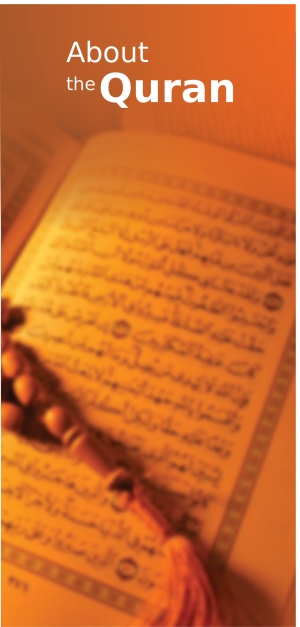The Quran is a book of revelations from God. Today it exists in the form of a book consisting of 114 chapters. They were sent down by the angel Gabriel or Jibril, bit by bit according to the demand of circumstances. The Quran is a revealed book: it is not authored by a human being. It is the actual word of God in human language. The Quran began to be revealed to the Prophet Muhammad through the angel Gabriel, in A.D. 610, while the Prophet was sitting in seclusion in the cave of Hira at the top of the Mountain of Light, two miles from Makkah. Thus the scriptures were not revealed in book-form at one point of time. Their various parts were revealed as the occasion demanded. It was later compiled in Madinah during the last days of the Prophet. The entire revelation was completed over a period of 23 years. The last passage was revealed to the Prophet while he was addressing a gathering at Mount Arafat after performing his last Hajj in A.D. 622.
“Do they not ponder over the Quran? If it had not come from God, they would have found in it many contradictions (ikhtilaf)” (4:82).
Themes of the Quran
The main theme of the Quran is to make people aware of the Creation Plan of God. According to this divine plan, man was created as an eternal being. The Creator divided man’s life into two parts, pre-death and post-death. The pre-death period is that in which man is put to the test. The post-death period is that in which he will be rewarded or punished. The former is temporary, while the latter will last for all eternity.
The Quran aims at bringing about an intellectual revolution in every human being. All its teachings are therefore spiritual in nature. All its verses address the human mind, their main thrust being to promote contemplation on nature, for which the Quranic words are tafakkur, tadabbur and tawassum. The Quran, in effect, strives to promote spiritual behaviour and peaceful conduct in national as well as international life.
A Book of Reflection
All the basic tenets of spirituality, ethics, and peaceful behaviour are laid down in the Quran in very clear terms. But the Quran is not a book of law; it is a book of reflection. Moreover, the Quran presents as a model of Quranic conduct the Prophet Muhammad. The Prophet, who lived a full life, followed Quranic teachings in all aspects of his practical behaviour. If one wants, therefore, to have an understanding of the tenets of the Quran, he may refer to the Quran and one who wants to become acquainted with the model of this Quranic conduct may study the life of the Prophet Muhammad, which is known as sirah.
Regarding the multi-religious society, the Quran is very practical. It gives the following formula: For you your religion, for me mine. In other words: Follow one and respect all. This formula is based on the well-known principle of peaceful coexistence indeed, the only way of existence in this world.
Regarding social life, the essence of Islamic teaching is that God has granted freedom to everyone. This freedom in itself demands that people should lead their lives with restraint. Because, if freedom is exercised without restraint, it will inevitably result in clash and breakdown, destroying social life in their wake.
The most repeated invocation in the Quran is “In the name of God, the most Beneficent, the most Merciful.” The occurrence of this invocation 114 times in the Quran is in itself an indication of how important it is. Every piece of work must have a beginning. It is the Quran’s desire that when one initiates any undertaking one should begin by uttering the name of God. One is thus always reminded of God’s attributes of benevolence and compassion.
Compassion for Humanity
The teaching of the Quran can be summed up under two basic headings: (1) Oneness of God: believing in One God and worshipping Him alone; (2) Brotherhood of Mankind: regarding all human beings as equal and according equal rights to all. These two kinds of precepts can be expressed as monotheism and justice.
The Quran tells us that God has given innumerable blessings to humanity. Man, as he benefits from this divine bounty, is duty-bound to offer thanks to his Benefactor. He is bidden to love and fear God more than anyone or anything else, and ought to consider himself accountable.
The Quran emphasizes the formation of one’s character through introspection and moulding oneself to the will of God. Nowhere does it enjoin the believer to engage in violence, leading to the destruction of fellow human beings.
For All Mankind
The Quran tells us, moreover, that the present world is intended to be a testing ground, specially designed for the trial of mankind, for God wants to see whether people are capable of leading their lives in accordance with His will. It is their conduct on earth that will determine whether or not they are deserving of Paradise in the next, eternal stage of life after death.
According to the Quran, Paradise is another name for God’s neighbourhood, and in this neighbourhood only those who are sincere in their belief in God and have compassion and love for God’s servants will find acceptance.
God has the same compassionate relationship with every man as a father has with all his children. Therefore, it is alien to the divine scheme of creation that this earthly plane should be marred by hatred, killing and violence. It is God’s most cherished desire that love should be returned for hatred, and violence should be met with peace.
Maulana Wahiduddin Khan







